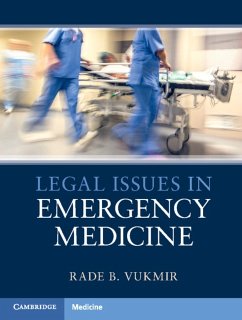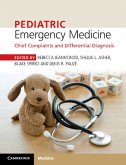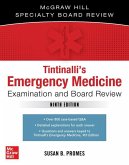Rade B. Vukmir
Legal Issues in Emergency Medicine
Rade B. Vukmir
Legal Issues in Emergency Medicine
- Gebundenes Buch
- Merkliste
- Auf die Merkliste
- Bewerten Bewerten
- Teilen
- Produkt teilen
- Produkterinnerung
- Produkterinnerung
The likelihood of confronting a medico-legal dilemma in emergency medicine is high. Legal Issues in Emergency Medicine provides an invaluable resource that equips medical providers, legal practitioners and administrators with the methods and the means of how to deal with such legal issues when they arise.
Andere Kunden interessierten sich auch für
![Sports Medicine for the Emergency Physician Sports Medicine for the Emergency Physician]() Sports Medicine for the Emergency Physician102,99 €
Sports Medicine for the Emergency Physician102,99 €![Pediatric Emergency Medicine Pediatric Emergency Medicine]() Pediatric Emergency Medicine85,99 €
Pediatric Emergency Medicine85,99 €![Urban Emergency Medicine Urban Emergency Medicine]() Urban Emergency Medicine43,99 €
Urban Emergency Medicine43,99 €![Handbook of Emergency Neurology Handbook of Emergency Neurology]() Handbook of Emergency Neurology54,99 €
Handbook of Emergency Neurology54,99 €![Models for Delivering High Quality Emergency Neurosurgery in High Income Countries Models for Delivering High Quality Emergency Neurosurgery in High Income Countries]() Matthew A. Boissaud-Cooke (University Hospitals Plymouth NHS Trust)Models for Delivering High Quality Emergency Neurosurgery in High Income Countries73,99 €
Matthew A. Boissaud-Cooke (University Hospitals Plymouth NHS Trust)Models for Delivering High Quality Emergency Neurosurgery in High Income Countries73,99 €![Tintinalli's Emergency Medicine Manual, Eighth Edition Tintinalli's Emergency Medicine Manual, Eighth Edition]() Rita CydulkaTintinalli's Emergency Medicine Manual, Eighth Edition92,99 €
Rita CydulkaTintinalli's Emergency Medicine Manual, Eighth Edition92,99 €![Tintinalli's Emergency Medicine Examination and Board Review Tintinalli's Emergency Medicine Examination and Board Review]() Susan PromesTintinalli's Emergency Medicine Examination and Board Review109,99 €
Susan PromesTintinalli's Emergency Medicine Examination and Board Review109,99 €-
-
-
The likelihood of confronting a medico-legal dilemma in emergency medicine is high. Legal Issues in Emergency Medicine provides an invaluable resource that equips medical providers, legal practitioners and administrators with the methods and the means of how to deal with such legal issues when they arise.
Hinweis: Dieser Artikel kann nur an eine deutsche Lieferadresse ausgeliefert werden.
Hinweis: Dieser Artikel kann nur an eine deutsche Lieferadresse ausgeliefert werden.
Produktdetails
- Produktdetails
- Verlag: Cambridge University Press
- Seitenzahl: 368
- Erscheinungstermin: 22. März 2018
- Englisch
- Abmessung: 255mm x 195mm x 26mm
- Gewicht: 866g
- ISBN-13: 9781107499379
- ISBN-10: 1107499372
- Artikelnr.: 50012249
- Herstellerkennzeichnung
- Libri GmbH
- Europaallee 1
- 36244 Bad Hersfeld
- gpsr@libri.de
- Verlag: Cambridge University Press
- Seitenzahl: 368
- Erscheinungstermin: 22. März 2018
- Englisch
- Abmessung: 255mm x 195mm x 26mm
- Gewicht: 866g
- ISBN-13: 9781107499379
- ISBN-10: 1107499372
- Artikelnr.: 50012249
- Herstellerkennzeichnung
- Libri GmbH
- Europaallee 1
- 36244 Bad Hersfeld
- gpsr@libri.de
Rade B. Vukmir MD, JD is President of Critical Care Medicine Associates, a medical service consulting enterprise. This medical consulting firm has a twenty-seven year history of providing comprehensive medical, legal, educational and medical industry consultative service. Dr Vukmir is trained in emergency and critical care medicine and has a degree in law with health care specialization. His focus is on patient safety, risk management, operational efficiency and innovation in emergency and critical care medicine.
1. Abandonment in the emergency department
2. Abandonment of patient by treating physician
3. Admission
4. Advance directives
5. Advanced practice providers
6. Adverse event disclosure
7. Against medical advice (AMA)
8. Americans with Disabilities Act (ADA) and education
9. Americans with Disabilities Act (ADA) and access to facilities
10. Assault
11. Assisted suicide
12. Battery
13. Bed boarding
14. Brain death
15. Care of children
16. Code response
17. Commitment
18. Communication
19. Competence and capacity
20. Confidentiality
21. Consultation
22. Controlled substances
23. Criminal charges
24. Criminal acts
25. Death certification
26. Decision-making
27. Difficult patient encounter
28. Discharge instructions
29. Disruptive provider behavior
30. Do Not Resuscitate (DNR)
31. Documentation
32. Domestic violence
33. Driving impairment
34. Drug and alcohol abuse
35. Duty to warn
36. Electronic health records (EHR)
37. Emergency consent
38. Emergency Medical Services (EMS)
39. Emergency Medical Treatment and Labor Act (EMTALA)
40. Employment issues
41. Expert witness
42. Fitness for duty
43. Frequent user
44. Futility
45. Geriatric abuse
46. Good Samaritan
47. Guidelines and protocols
48. Health Insurance Portability and Accountability Act (HIPAA) / Health Information Technology for Economic and Clinical Health Act (HITECH)
49. HIV
50. Hospital medicine
51. Immigrant care
52. Impaired physician
53. Indigent care
54. Inflight emergencies
55. Informal consultation
56. Informed consent
57. Insurance
58. Intoxication
59. Laboratory testing
60. Left without being seen (LWBS) / left without treatment (LWOT) / elopment
61. Malpractice claims
62. Mandatory care
63. Mandatory reporting
64. Medical education
65. Medical errors
66. Medical records
67. Medical Screening Exam (MSE)
68. Minor consent
69. Missed illness and injury
70. Multiple visits
71. Nursing
72. Operations
73. Organ donation
74. Overcrowding
75. Pain control/medication
76. Patient satisfaction
77. Pediatric abuse
78. Peer review
79. Policy/procedure
80. Pregnancy
81. Prescription writing
82. Privacy
83. Professional boundary issues
84. Protected health information (PHI)
85. Psychiatric care
86. Referral
87. Religion
88. Research
89. Restraint
90. Resuscitation
91. Service contract
92. Sexual assault
93. Social media
94. Staff privileges
95. Subpoena
96. Substance abuse
97. Suicide
98. Telemedicine
99. Telephone advice
100. Third-party duty
101. Transfer
102. Translation, interpreting, and language issues
103. Triage
104. Unanticipated death
105. Urgent care
106. Violence
Glossary.
2. Abandonment of patient by treating physician
3. Admission
4. Advance directives
5. Advanced practice providers
6. Adverse event disclosure
7. Against medical advice (AMA)
8. Americans with Disabilities Act (ADA) and education
9. Americans with Disabilities Act (ADA) and access to facilities
10. Assault
11. Assisted suicide
12. Battery
13. Bed boarding
14. Brain death
15. Care of children
16. Code response
17. Commitment
18. Communication
19. Competence and capacity
20. Confidentiality
21. Consultation
22. Controlled substances
23. Criminal charges
24. Criminal acts
25. Death certification
26. Decision-making
27. Difficult patient encounter
28. Discharge instructions
29. Disruptive provider behavior
30. Do Not Resuscitate (DNR)
31. Documentation
32. Domestic violence
33. Driving impairment
34. Drug and alcohol abuse
35. Duty to warn
36. Electronic health records (EHR)
37. Emergency consent
38. Emergency Medical Services (EMS)
39. Emergency Medical Treatment and Labor Act (EMTALA)
40. Employment issues
41. Expert witness
42. Fitness for duty
43. Frequent user
44. Futility
45. Geriatric abuse
46. Good Samaritan
47. Guidelines and protocols
48. Health Insurance Portability and Accountability Act (HIPAA) / Health Information Technology for Economic and Clinical Health Act (HITECH)
49. HIV
50. Hospital medicine
51. Immigrant care
52. Impaired physician
53. Indigent care
54. Inflight emergencies
55. Informal consultation
56. Informed consent
57. Insurance
58. Intoxication
59. Laboratory testing
60. Left without being seen (LWBS) / left without treatment (LWOT) / elopment
61. Malpractice claims
62. Mandatory care
63. Mandatory reporting
64. Medical education
65. Medical errors
66. Medical records
67. Medical Screening Exam (MSE)
68. Minor consent
69. Missed illness and injury
70. Multiple visits
71. Nursing
72. Operations
73. Organ donation
74. Overcrowding
75. Pain control/medication
76. Patient satisfaction
77. Pediatric abuse
78. Peer review
79. Policy/procedure
80. Pregnancy
81. Prescription writing
82. Privacy
83. Professional boundary issues
84. Protected health information (PHI)
85. Psychiatric care
86. Referral
87. Religion
88. Research
89. Restraint
90. Resuscitation
91. Service contract
92. Sexual assault
93. Social media
94. Staff privileges
95. Subpoena
96. Substance abuse
97. Suicide
98. Telemedicine
99. Telephone advice
100. Third-party duty
101. Transfer
102. Translation, interpreting, and language issues
103. Triage
104. Unanticipated death
105. Urgent care
106. Violence
Glossary.
1. Abandonment in the emergency department
2. Abandonment of patient by treating physician
3. Admission
4. Advance directives
5. Advanced practice providers
6. Adverse event disclosure
7. Against medical advice (AMA)
8. Americans with Disabilities Act (ADA) and education
9. Americans with Disabilities Act (ADA) and access to facilities
10. Assault
11. Assisted suicide
12. Battery
13. Bed boarding
14. Brain death
15. Care of children
16. Code response
17. Commitment
18. Communication
19. Competence and capacity
20. Confidentiality
21. Consultation
22. Controlled substances
23. Criminal charges
24. Criminal acts
25. Death certification
26. Decision-making
27. Difficult patient encounter
28. Discharge instructions
29. Disruptive provider behavior
30. Do Not Resuscitate (DNR)
31. Documentation
32. Domestic violence
33. Driving impairment
34. Drug and alcohol abuse
35. Duty to warn
36. Electronic health records (EHR)
37. Emergency consent
38. Emergency Medical Services (EMS)
39. Emergency Medical Treatment and Labor Act (EMTALA)
40. Employment issues
41. Expert witness
42. Fitness for duty
43. Frequent user
44. Futility
45. Geriatric abuse
46. Good Samaritan
47. Guidelines and protocols
48. Health Insurance Portability and Accountability Act (HIPAA) / Health Information Technology for Economic and Clinical Health Act (HITECH)
49. HIV
50. Hospital medicine
51. Immigrant care
52. Impaired physician
53. Indigent care
54. Inflight emergencies
55. Informal consultation
56. Informed consent
57. Insurance
58. Intoxication
59. Laboratory testing
60. Left without being seen (LWBS) / left without treatment (LWOT) / elopment
61. Malpractice claims
62. Mandatory care
63. Mandatory reporting
64. Medical education
65. Medical errors
66. Medical records
67. Medical Screening Exam (MSE)
68. Minor consent
69. Missed illness and injury
70. Multiple visits
71. Nursing
72. Operations
73. Organ donation
74. Overcrowding
75. Pain control/medication
76. Patient satisfaction
77. Pediatric abuse
78. Peer review
79. Policy/procedure
80. Pregnancy
81. Prescription writing
82. Privacy
83. Professional boundary issues
84. Protected health information (PHI)
85. Psychiatric care
86. Referral
87. Religion
88. Research
89. Restraint
90. Resuscitation
91. Service contract
92. Sexual assault
93. Social media
94. Staff privileges
95. Subpoena
96. Substance abuse
97. Suicide
98. Telemedicine
99. Telephone advice
100. Third-party duty
101. Transfer
102. Translation, interpreting, and language issues
103. Triage
104. Unanticipated death
105. Urgent care
106. Violence
Glossary.
2. Abandonment of patient by treating physician
3. Admission
4. Advance directives
5. Advanced practice providers
6. Adverse event disclosure
7. Against medical advice (AMA)
8. Americans with Disabilities Act (ADA) and education
9. Americans with Disabilities Act (ADA) and access to facilities
10. Assault
11. Assisted suicide
12. Battery
13. Bed boarding
14. Brain death
15. Care of children
16. Code response
17. Commitment
18. Communication
19. Competence and capacity
20. Confidentiality
21. Consultation
22. Controlled substances
23. Criminal charges
24. Criminal acts
25. Death certification
26. Decision-making
27. Difficult patient encounter
28. Discharge instructions
29. Disruptive provider behavior
30. Do Not Resuscitate (DNR)
31. Documentation
32. Domestic violence
33. Driving impairment
34. Drug and alcohol abuse
35. Duty to warn
36. Electronic health records (EHR)
37. Emergency consent
38. Emergency Medical Services (EMS)
39. Emergency Medical Treatment and Labor Act (EMTALA)
40. Employment issues
41. Expert witness
42. Fitness for duty
43. Frequent user
44. Futility
45. Geriatric abuse
46. Good Samaritan
47. Guidelines and protocols
48. Health Insurance Portability and Accountability Act (HIPAA) / Health Information Technology for Economic and Clinical Health Act (HITECH)
49. HIV
50. Hospital medicine
51. Immigrant care
52. Impaired physician
53. Indigent care
54. Inflight emergencies
55. Informal consultation
56. Informed consent
57. Insurance
58. Intoxication
59. Laboratory testing
60. Left without being seen (LWBS) / left without treatment (LWOT) / elopment
61. Malpractice claims
62. Mandatory care
63. Mandatory reporting
64. Medical education
65. Medical errors
66. Medical records
67. Medical Screening Exam (MSE)
68. Minor consent
69. Missed illness and injury
70. Multiple visits
71. Nursing
72. Operations
73. Organ donation
74. Overcrowding
75. Pain control/medication
76. Patient satisfaction
77. Pediatric abuse
78. Peer review
79. Policy/procedure
80. Pregnancy
81. Prescription writing
82. Privacy
83. Professional boundary issues
84. Protected health information (PHI)
85. Psychiatric care
86. Referral
87. Religion
88. Research
89. Restraint
90. Resuscitation
91. Service contract
92. Sexual assault
93. Social media
94. Staff privileges
95. Subpoena
96. Substance abuse
97. Suicide
98. Telemedicine
99. Telephone advice
100. Third-party duty
101. Transfer
102. Translation, interpreting, and language issues
103. Triage
104. Unanticipated death
105. Urgent care
106. Violence
Glossary.








